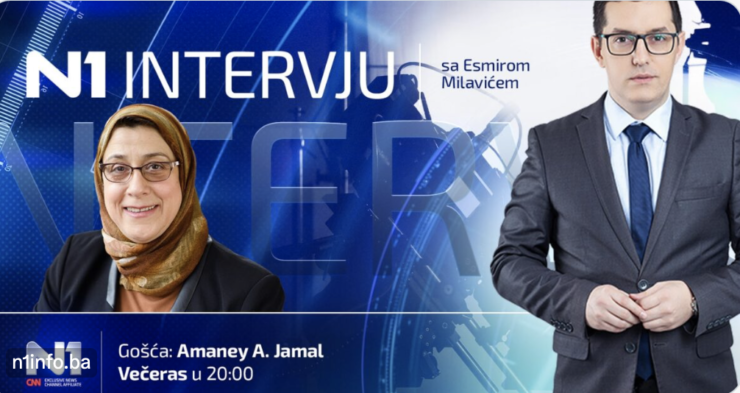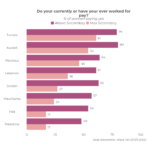
Why do Palestinians not support either Hamas or the Palestinian Authority? Who would win the presidential election today? How influential is Iran and how many other powers? Can a two-state solution be achieved? Amaney A. Jamal, dean of the School of Public and International Affairs at Princeton University and co-principal of the Arab Barometer, answers these and other questions based on the latest major survey of public opinion in Gaza and the West Bank.
N1: Professor, you and a colleague wrote a very extensive and very interesting article on Foreign Affairs, which is deepened based on your research on the Arab Barometer, where your common principle is how the Palestinians see their leadership and it is not much of a surprise, they are not satisfied with what was Hamas working in Gaza before October 7. What your data tells you.
JAMAL: Yeah, that’s a great question. What we find is that there was little support for Hamas before the events of October 7th. What you see among the Palestinian population is that there is a lot of dissatisfaction with the government led by Hamas. The perception of corruption was on the rise. About 3/4 or 75% of the Palestinian population in Gaza believe that there is widespread corruption or sufficiently widespread corruption within the ranks of the Palestinian government led by Hamas. The level of trust in the Hamas government is declining. About 67% have little or no confidence in the government led by Hamas. If the elections were held in October during the period we were researching, if the elections were held today, but it’s in that window, only about 24% would have voted for Ismail Hani as opposed to other Palestinian leaders. Unfortunately, Mahmoud Abbas doesn’t get much higher marks either. And when we ask respondents in Gaza which political party are you closest to? Only 27% say they are close to Hamas, and 30% say they are closer to Fatah. However, the vast majority say that they are not close to any party.
N1: So if we take into account that information before October 7, it means that people in Gaza are not happy with how everything is working. You also showed in your research that young people are not satisfied with how the government is currently working.
JAMAL: That’s right. What you see in these surveys is that the economic situation in Gaza before the terrible attacks on Israelis on October 7 was getting extremely difficult and worse. So, ¾ of the citizens in Gaza, 75% of the citizens in Gaza stated that they did not have enough food to eat in the previous month. So that means 75% of the population of Gaza complains of hunger or food security, lack of food security. Before the attack on Israel on October 7, those numbers had risen dramatically compared to the 7th wave of the Arab Barometer, which was conducted in October 2021. There we found 51% complaining of food insecurity. So the percentage increase is over a quarter. More of the population reports a lack of ability to feed their families in the previous month. So it is clear that the citizens of Gaza publicly blame the mismanagement of the government led by Hamas.
N1: You mentioned those two names, but there is also a third name when it comes to the election of the president. If the elections were today, Ismail Haniyeh who was the leader of Hamas, Mahmoud Abbas, who is the current president for 18 years, and the third is in an Israeli prison for life. But he would still win against these two.
JAMAL: Exactly. Marwan Barghouti is the third person who enjoys great popularity among the Palestinian people. The Palestinian people see Marwan Barghouti again as someone who people often say, well, he’s in prison basically for terrorism, for killing Israelis, and he’s got a life sentence so why do the Palestinians support him? And it’s not so much about “he’s labeled a terrorist” or people thinking of him as a terrorist. They see him as an honest person, a person who did not compromise his values when it comes to the Palestinian people so that they would see him, that he would ultimately be an honest mediator, a ruling authority that would not subject itself to corruption and authoritarianism as such. So I want to assure the viewers that, I repeat, it is not about supporting terrorism, but about the fact that they are fed up with inadequate political governance…
Watch Full Interview at N1


